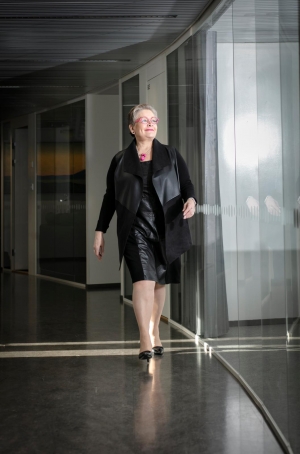Ann Selin reviews four years in numbers: “The voice of PAM members is heard”
PAM’s outgoing President, Ann Selin, looks back over her last four-year period and forward into the 2020s: what impact do PAM members have, why was the competitiveness pact entered into – and why should we not fear digitalisation?
5 words worth recalling
"When PAM’s current strategy was being considered four years ago, every word in the sentence ending in the vision 'PAM members: impact and setting the pace in working life' was significant.
We weren’t talking about what PAM is, but about PAM’s members. The idea was to stress that the union and its members are one and the same, and every member can have an impact whatever their position is. The words working life set out the context, because although there are unemployed members and we try to influence social security, for example, everything is nonetheless defined via working life. Setting the pace carries on from the previous vision of being the most modern trade union in Finland, but also relates to initiative and activities for the long-term, which were talked about a lot four years ago. Impact was at the heart of everything: for example, PAM’s communications have been updated with a view to their impact. Those words have guided our activities and we have been able to rely on them when we have made choices.
I think that PAM’s impact has grown over these four years. We are listened to and we are more able to put forward our views in various forums. In the past many organisations only wanted to meet with union presidents, but now for example the union is represented at parliamentary committees by our experts on different themes. Our activists are also listened to: it is thought that they speak on PAM’s behalf, for example on tourism or retail development planning, in municipal or county policy bodies."
4th year organising
”The impulse for starting work on organising* came at the previous Congress in 2015. At the time many Congress representatives and PAM staff were a little unclear what exactly this meant. Perhaps the first year went on figuring this out. In the second year a core group doing the actual organising learned what organising is and what activities it requires. In the third year there began to be broader acceptance and understanding that this was a permanent change in approach, and some ‘teething troubles’ were overcome. Now in the fourth year this is already coming naturally in what many people do.

This is very long-term work that requires determination. PAM’s membership total has gone down in recent years even though we are more active at workplaces than for a long time, but I don’t think organising is behind this drop. PAM’s Executive Committee will examine the results more closely this spring: what is working, what were the successes, what approaches didn’t work, and what are the conclusions. But I do think it is right that we have returned more to our roots and to the people in the workplace.”
For the 1 cent or for everybody?
”I am proud that socially sustainable economic policy is one of PAM’s objectives. You could take the easy route by falling in with those who think that economic growth solves everything and growing income inequality is ok. But we don’t want to take the easy route. Fortunately a small but growing group of economists, social policy experts and others think, as we do, that growing income and wealth inequality causes problems. It even harms investors. One reason for the rise in populist movements in Europe is that some people don’t feel that they are really part of society. Then the simple solutions peddled by populists start to look attractive. We can challenge received economic truths, and Finland can punch above its weight if we put forward good analyses at the EU level, for example. Let’s put people at the centre.”
0 increases vs. coercive laws
”After the parliamentary elections in 2015 we knew that the incoming government wouldn’t be especially wage earner-friendly. Unusually, Juha Sipilä attended a meeting of our central organisation SAK even before his government had been appointed, and said that a social contract was needed. He seemed to think that as a business manager leading the country he could order the various actors in society to dance to his tune. That’s not what the labour market is used to.
”Zero increases weren’t the major issue here, the main concern was to ward off bigger threats.”
There was no social contract on the conditions laid down, and the government proposed so-called coercive laws, which provoked huge resistance. In this process we were defending the entire agreement system, not just individual impairments. We were getting messages of solidarity from organisations in countries like Mozambique and Columbia that we are used to supporting ourselves.
We were between a rock and a hard place when after a long process we entered into competitiveness pact* efter en lång process. This was one of the toughest undertakings of my career. Trust in the government was thin on the ground. We were sure that if we don’t go along with the pact they would implement the threatened cuts as well as further undermining the position of employees. Zero increases weren’t the major issue here, the main concern was to ward off bigger threats."
3,2 per cent anchor
”The employers’ federation the Confederation of Finnish Industries (EK) changed the rules by no longer making centralised collective agreements. This didn’t prevent employers’ organisations co-ordinating closely, however. In autumn 2017 Technology Industries of Finland made a two-year collective agreement with wage increases of 3.2 per cent. The employers thought that this would be the maximum level in the 2018 union round, and it was monitored very closely – more closely than before in the comprehensive income policy settlement*. Strangely, even the National Conciliator announced that this would be a ceiling. Employers also thought that some industries would agree to lower increases, but in practice 3.2 per cent became a minimum in the negotiations. We tried to listen to our members when making the case for wage increases for different groups of employees."
Benefits of tripartite
"In many historical situations Finland has been rescued by the tripartite system*: major reforms have been made without social unrest. The present government has had a different approach to tripartite than what the parties are used to. Sometimes co-operating has meant listening to the government’s plans for half an hour – which doesn’t give employees much of a voice. Then they wonder why people take to the streets. This happens all the time in central Europe when organisations have no say in drafting legislation.
”Tripartite work is often dull, and compromises aren’t sexy, but they are stable and predictable!”
I have heard from business representatives too that they want stability and predictability. Tripartite work is often dull, and compromises aren’t sexy, but they are stable and predictable! Last year the last version of the so-called dismissal law was a better example of true tripartite drafting of legislation. And PAM was instrumental in blocking the original unfair draft.

The role of Suomen Yrittäjät has also grown in this parliamentary term, but in my opinion they haven’t really seized the opportunity since a sense of compromise has been lacking.”
The 2020s
”Politics hasn’t been talked about in workplace canteens this much for years. People have realised how it affects their everyday lives. I hope that this continues. It is well known that the low-skilled and socially disadvantaged and the young often turn out to vote less. We support raising voter turnout. It’s bad for democracy if young people for example don’t vote, especially since they are affected by many of the matters decided in the state budget.
Digitalisation will change working life, but I would like to say: ‘keep calm’. Work has always changed and always will change. Now perhaps more rapidly than we are used to, but work won’t go away even if some functions disappear. There’s no need to be afraid or think that this is something totally uncontrollable. Nonetheless PAM will have to be more attentive to how change can happen in a controlled way, and how we can have an impact.”
If you are a member of PAM, you can also make an impact by voting in PAM's Congress elections laterst by 8 April.
Glossary*
• Organising means increasing the activity of workplaces and workers. PAM supports workplaces in this. This involves electing shop stewards at workplaces that don’t have one, but also empowering the whole community to influence their own affairs.
• The competitiveness pact was a comprehensive collective settlement made in 2016 when the economy was in difficulties. It froze pay rises for a year and in many sectors increased added 24 hours to the working year. At the same time employees’ pension and insurance contributions were increased and employers’ contributions decreased.
• Tripartite refers to a model where employment-related legislation is drafted jointly by the government and employees’ and employers’ organisations such that all parties can accept the reforms agreed on.
• Comprehensive income policy settlements mean collective bargaining by employees’ and employers’ organisations for several sectors.



